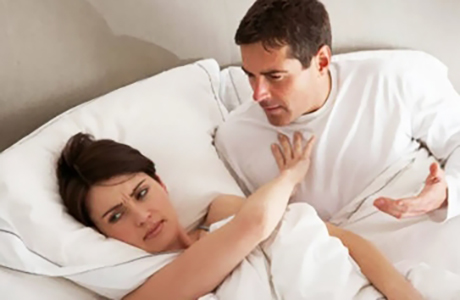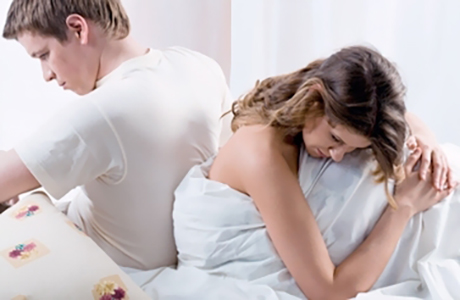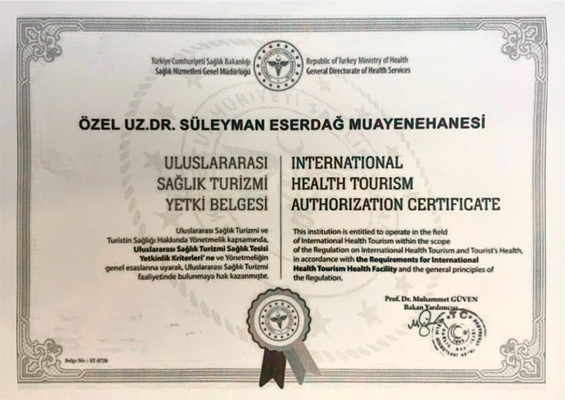Vaginismus is a failure of sexual penetration or very painful intercourse because of involuntary contraction of vaginal muscles during sexual intercourse. It is the problem of ‘sexual dysfunction’ and ‘contraction in sexual intercourse’ in women. It is also known as ‘first night fear’. Most vaginismus women are still virgin despite their marriage for months or even years.
Current vaginismus definition
According to a current definition of vaginismus; the underlying reason is the inability of the woman not allowing her partner’s penis enter her vagina and also suppository, tampon, finger and gynecological examination. Vaginismus is one of the most common but the most hidden sexual problems in Turkey.
What is vaginismus?
According to DSM 5 classification by the American Psychiatric Association in 2013, vaginismus and dyspareunia (painful sexual intercourse) problems are in the same category as ‘Genitopelvic Pain and Penetration Disorders’. In other words, it is referred to pelvic pain and penetration disorder during sexual intercourse.
Vaginismus is an anxiety disorder!
Vaginismus is a concern of ‘deep fear’ of women about sexual intercourse. Reactions like panic attack during sexual penetration are among the symptoms. Rather than real pain, vaginismus patients have the typical fear of pain during sexual intercourse. The main reason in vaginismus is the involuntary contraction of ‘pelvic floor muscles’ surrounding the vagina. Among these pelvic muscles located in the pelvis, most prominent muscles are PC (pubococcygeus) muscle, bulbospongiosus, ischiocavernosus and transverse perineal muscles.
Pelvic floor muscles are extremely important in birth, urination and defecation, sexual relation and involvement of the organs in pelvis. Involuntary contractions in women occur even in the thought of sexual intercourse. Depending on the severity of the problem, contractions and body reactions vary.
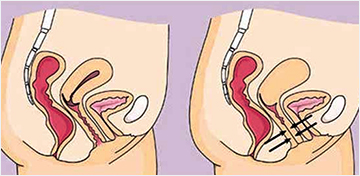 What does vaginismus mean? Negative conditioning situation
What does vaginismus mean? Negative conditioning situation
In vaginismus, there is a vicious cycle of "intercourse-fear-pain". When the penis touches to the vagina, pain in the vagina entrance increases contraction and this contraction increases the pain. Dryness at the time of penetration increases the pain further. In the end, the woman acknowledges the feeling and reaction of pain in her mind even without penis touching to the vagina.
Thus, the woman learns not to allow her partner to approach her. This situation is called as ‘learned helplessness’ or psychologically ‘negative conditioning’.
PC (Pubococcygeus) Muscle
The most important pelvic muscle group in vaginismus is Pubococcygeus muscles. Pubococcygeus is abbreviated as PC muscle. This muscle group at the entrance of the vagina is out of control during sexual intercourse in vaginismus patients, and it contracts and relaxes by itself ‘waywardly’.
Thus, male partner encounters with the feeling of ‘hitting to the wall’ in the penetration attempts of the penis. Whereas, how urine and stool consistency can be made, it is also possible to relax the muscles voluntarily during sexual intercourse .
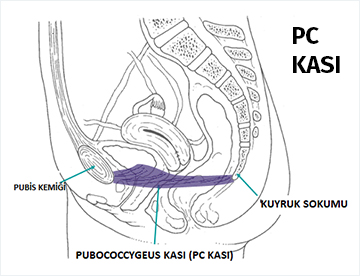 The PC muscle is one of the most important pelvic floor muscles. It plays a role in many functions. It plays a key role in the functioning of both the reproductive system and the urinary system. These muscles function in many situations from urination to delivery and are connected to the bone skeleton by drawing a line from the urethra, where urinary canal exists, up to the anus which is the exit of the large intestine.
The PC muscle is one of the most important pelvic floor muscles. It plays a role in many functions. It plays a key role in the functioning of both the reproductive system and the urinary system. These muscles function in many situations from urination to delivery and are connected to the bone skeleton by drawing a line from the urethra, where urinary canal exists, up to the anus which is the exit of the large intestine.
The PC muscle is important for women to hold their urine and stool, to achieve orgasm in sexual intercourse and keep pelvic organs in the place. It also plays an important role in childbirth.
One of the main goals in the treatment of vaginismus is to recognize PC muscles, to understand its location, function and to learn to control them correctly.
Vaginismus and sexual desire loss are different concepts
Women who have vaginismus love their partners, arousal and lubrication occurs in woman during foreplay, even orgasm can be achieved with mechanic pressure on the clitoris. However, this desire suddenly decreases during the attempt of sexual penetration and in later stages due to fear of pain, or pain, ache and sexual failures. Even the thought of sexual intercourse can bring fear and contraction together.
Vaginismus and sexual desire loss
There is no sexual desire problem in vaginismus, but this may develop over the time. The biggest reason for sexual desire loss is the fear of pain and ache. Sexual desire usually increases spontaneously after vaginismus is treated.
The incidence of vaginismus
According to our own studies and observations within HERA Vaginismus Treatment Educational and Research Association; vaginismus incidence in Turkey is about 20 or 30 times more than European countries and the United States. In other words, the vaginismus problem is seen in one out of every 10 women in Turkey.
What do vaginismus patients feel?
Vaginismus patients are generally obsessed with the reason of having this problem. Most of the patients become introverted as if they are the only ones having vaginismus problem in the world, feel self-pity and get into depression. They think that ‘why can’t I achieve it although other women can do so easily’. Questions like ‘why me, why this happened to me’ decrease the joy of life. However, the important point is to find the most appropriate solution immediately rather than puzzle their brains with the reasons.
What is vaginismus treatment?
Vaginismus is a sexual problem which can be completely treated. It is possible to treat permanently with scientific methods in a very short time. Different methods are applied for vaginismus treatment. Finger exercises, usually recommended by psychologists and psychiatrists, are difficult and painful treatments, and such vaginismus treatments can last for months. Finger exercises are boring and repulsive for some of the patients. Therefore, it is not a preferred treatment method by us.
Our treatment methods for vaginismus
There is no finger exercise in cognitive and behavioral treatment methods which is applied by us. It is aimed to provide permanent cure in a very short time such as 3 days by ‘attack therapy’.
Nowadays, it is possible to reach the result in a short time without pain thanks to the simplified methods for patients. Supportive methods such as Acupuncture, EMDR, Botulinium toxin injections[O1] , Hypnosis and NLP can be applied to increase the success of our treatments.
What does vaginismus mean? Different definitions, different descriptions
Vaginismus is described as ‘phobic reaction’ in sexual intercourse by American Behavioral Sexual Therapist Helen Singer Kaplan. It is also defined as avoidance and retardation disease.
Many couples who have this problem cannot share this private situation about their marriages going on without sexual intercourse for many months or even years. They are ashamed of the situation. Therefore, the solution process is prolonged.
Vaginismus is also described as ’incomplete marriage'. There are also different definitions like postponing and avoidance disease.
Again, according to our own statistics (HERA); 90% of patients who applied to Istanbul, Ankara and Izmir clinics are still virgin since they could not have any relationship with their partners. Although 10% had lost their virginity after one or several relationships, it did not continue at all.
Is vaginismus a disease? Should it really be considered as a disease?
Most of the patients with vaginismus hold on to life again and feel as a real husband and wife after the treatment.
To summarize, vaginismus is a sexual problem and certainly requires support. Unless treated, the problem grows like an avalanche and brings different problems together. Perhaps the most difficult part of starting the treatment is that the spouses do not see vaginismus as a disease, or because they do not believe that their spouses will be treated and resist against the treatment.
To see this sexual problem as a disease, to accept it at first, and then to seek a cure will be the most important steps.

 What does vaginismus mean? Negative conditioning situation
What does vaginismus mean? Negative conditioning situation The PC muscle is one of the most important pelvic floor muscles. It plays a role in many functions. It plays a key role in the functioning of both the reproductive system and the urinary system. These muscles function in many situations from urination to delivery and are connected to the bone skeleton by drawing a line from the urethra, where urinary canal exists, up to the anus which is the exit of the large intestine.
The PC muscle is one of the most important pelvic floor muscles. It plays a role in many functions. It plays a key role in the functioning of both the reproductive system and the urinary system. These muscles function in many situations from urination to delivery and are connected to the bone skeleton by drawing a line from the urethra, where urinary canal exists, up to the anus which is the exit of the large intestine.

